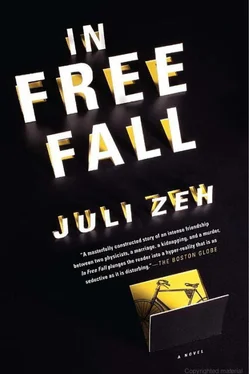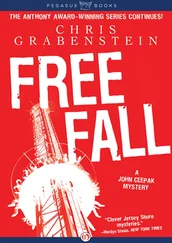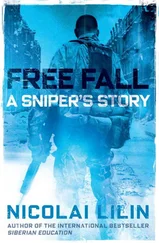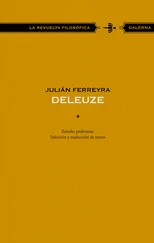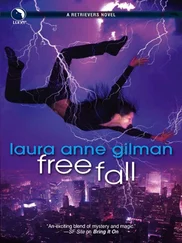“Let us assume that a human being stands before reality like someone walking along the shore of a peaceful lake. The smooth surface of the water reflects a familiar world and hides what is beneath. Now a large bough floats to the surface, and only the tips of two separate branches emerge from the water in different places. The person by the lake will not perceive this as a bizarre coincidence. He will quite rightly assume that the branches are connected to one another beneath the water. Without realizing it, he has understood what coincidence is.
“You haven’t drunk your tea, Detective. Are you about to go?”
THE DETECTIVE, WHOSE EYES HAVE OF COURSE been anything but blank throughout, thinks it quite unlikely that Sebastian has said all this. But the professor would certainly have said something, and Schilf has filled in the rest himself. He had stirred his tea through the entire lecture, as if expecting to hear another death sentence. Now he stands up, swaying lightly, like a doll struggling to maintain its balance. Fighting his headache, he waits for one of the questions that are the purpose of his visit to surface.
“Who described you as esoteric?” he finally asks.
“Oskar,” Sebastian says.
He looks at the detective through pale eyes. He has some color to his face now, and the way in which his fingers are playing a piano sonata on his lap shows that the talking has done him good.
“Who’s that?”
“That’s an excellent question.”
Leaning his head back, Sebastian listens, as if he is trying to pick out the right answer from the song of the titmice in the wisteria. Favorite person , they twitter, favorite person.
“A great physicist, who is working on a new particle accelerator in Geneva. If you’re interested in physics, you should go. The very bowels of the universe are studied there.”
“By materialists, I assume.”
“You’ve got it.” Sebastian laughs. “Although I’m not at all sure about Oskar any longer. I was wondering only yesterday if we haven’t misunderstood each other all our lives.”
The detective looks at him for a moment longer than necessary before he nods. “Does the particle accelerator have any practical use?” he asks.
“Its by-products do, Oskar would say. For example, accelerated particles are used to irradiate tumors in medical science.”
“Look.”
Schilf is swaying even more than before. He makes a grab for the armchair and his fingers catch hold of a Swiss Army knife that has been driven into the leather of the chair. He puts it on the side table. There is blood on the blade. Schilf’s headache is suddenly gone, as if someone has thrown a switch.
“You’ve been very helpful,” he says.
Sebastian looks at the knife thoughtfully and wonders if it’s a sign, and if so, of what. In an instant he feels completely drained, and when he finally looks up, the detective is already in the hall. He is not walking toward the door, but farther into the apartment.
“The door’s that way!” Sebastian calls, following him.
“I’d like to meet your son before I go.”
“But he’s sleeping.”
“Not anymore.”
His eyes blinking like someone emerging from a matinee into the daylight, Sebastian stays in the hall while Schilf walks toward his son’s room and turns the doorknob.
LIAM SITS ON A CHAIR that he has yet to grow into, with an open book that he is not reading. The room is dim and so small that the furniture seems to be jostling for space. A ray of light coming through the curtains gilds his head with silver and gold. An angel with a crown of sunshine. Schilf swallows to suppress his emotion.
“Hello,” he says after clearing his throat. “I’m from the police.” And when Liam does not respond, he says, “I’m a proper detective, like on TV.”
The book is clapped shut and Liam turns his chair around.
“I’m little, but I’m not stupid,” he says. “You can talk to me quite normally.”
Looking at Liam’s worried face, Schilf wonders how old the boy is. His soft hair has been pressed down by sleep and his scalp shows through in some places. The face beneath is serious and attentive. Schilf suddenly wonders if this child with his sharp ears can hear the voice of the observer who is asking himself if the sharp ears of a child can hear the voice of the observer. And if that is why Liam is looking at him so strangely.
“Are you in pain?” the boy asks.
Schilf looks around for somewhere to sit and settles on the edge of the unmade bed.
“No,” he says. “Not at the moment.”
Liam puts his book down, which takes three years off his appearance, and turns the chair a bit more so that he is sitting directly in front of Schilf, their kneecaps almost touching.
“What are you doing here?”
“I’m investigating your kidnapping.”
Liam looks at his hands in silence, as if he is wondering whether his fingernails need cutting.
“Yes,” he says finally. “The kidnapping.”
“Are you angry about leaving scout camp early?”
“What do you mean, angry?” He rubs his eyes so hard that Schilf feels like taking hold of his wrists to stop him. “My father just picked me up early this morning. He was acting very strangely, and he didn’t tell me what was going on.”
“I know the feeling,” Schilf says. “No one tells me what’s going on either. But there have to be people like us, too.”
A smile spreads across Liam’s face, making him look pleasant as well as precocious and intelligent. There is something helpless in his eyes, like a small animal looking into the face of an approaching disaster that it can do nothing about.
“Will you clear this all up?”
“Most probably.”
“Promise?”
“Promise.”
The boy looks down at the floor to hide the glimmer in his eyes, and Schilf puts a hand on his shoulder.
“Liam,” he says. “Were you kidnapped on the way to Gwiggen?”
“Did my father say that?”
“Just give me an answer.”
“My father doesn’t lie. He loves truth above all else.”
“He loves you first,” the detective says. “Then the truth.”
When Liam lifts his head, he looks like a shrunken adult again.
“If I were to say that I wasn’t kidnapped, and my father says the opposite, can we both be telling the truth?”
“Yes,” the detective says quickly.
“Then I’ll say that I don’t know anything about a kidnapping.”
“Who took you to Gwiggen?”
“My father.”
“Are you sure?”
“I was asleep. And when I woke again, it was dark, and I was in a strange bed. Isn’t that what it says in the file?”
“More or less.” With a swift movement Schilf wipes the laugh away from his mouth and chin. “But it’s my job to ask about things that I already know. Could it be that you were sleeping very soundly?”
“Children are like that,” Liam replies earnestly. “Besides, the motion sickness pills make me drowsy.”
“Can I have a look at them?”
“I only had one for the way there and one for the way back.”
The detective nods and looks over Liam’s head at a diagram in a glass frame on the wall. The solar system is depicted in the bottom right-hand corner, on a dark blue background. An arrow indicates the sun and its planets as a tiny point in a group of twenty fixed stars. Another arrow points from these stars to a barely discernible particle vanishing into the starry mist of the Milky Way. And the Milky Way itself is a fingernail-sized blob in a wider collection of galaxies, which, together with untold groups of other galaxies, form a supercluster. This supercluster is depicted as nothing more than a small patch of mist in the known universe, which is shown as a large hazy layer covering the diagram like a lid. Above it is a sentence: “Galaxies are to an astronomer what atoms are to a nuclear physicist.”
Читать дальше
